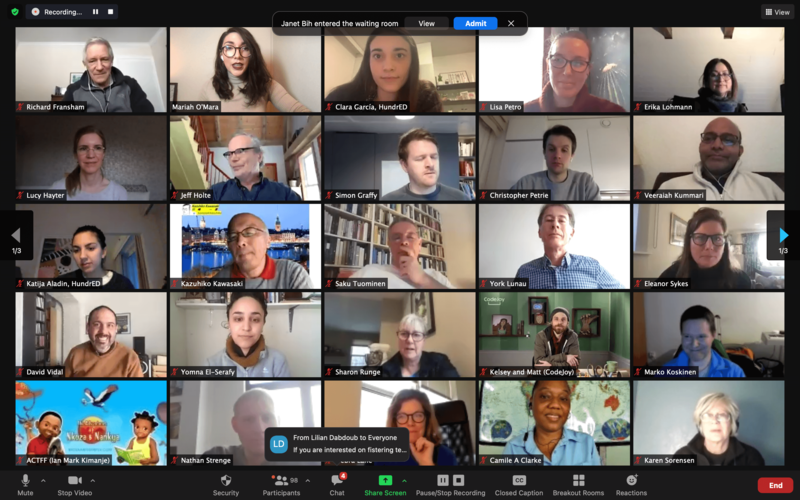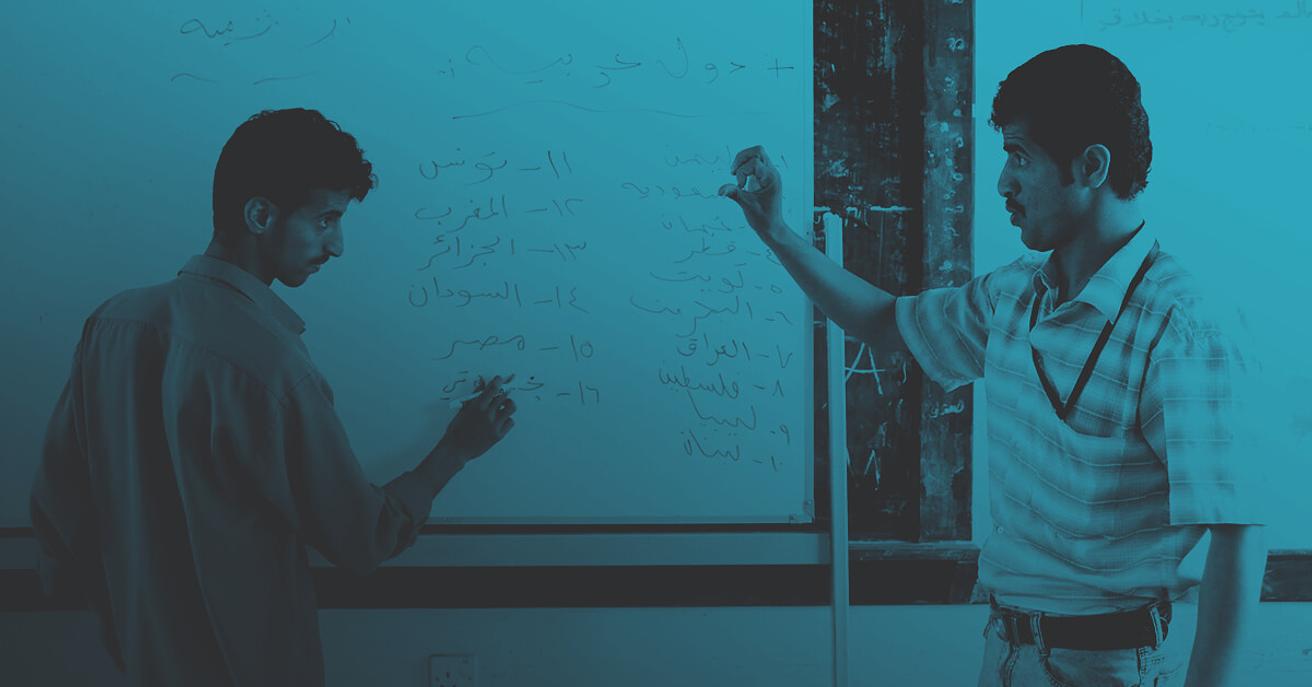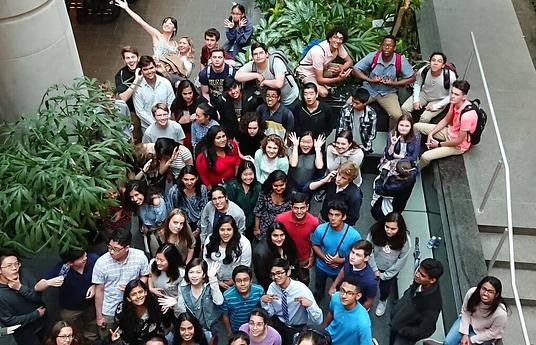Last month, we hosted a webinar on Transforming Teacher Professional Development through Technology, featuring guest speaker Cristóbal Cobo from the World Bank. The conversation brought together a diverse group of over 160 education stakeholders from around the world. During the workshop, participants were encouraged to share their experience with teacher professional development both the challenges and potential solutions.
The Teachers for a Changing World Spotlight is a joint initiative from The World Bank Group and HundrED, with financing from Global Partnership for Education (GPE). The project aims to identify solutions that support the continuous professional development of teachers in an ever-changing classroom. We are accepting submissions in 5 languages: English, Spanish, Portuguese, French, and Arabic making it our most ambitious Spotlight yet! If you are currently working to enhance teacher professional development we highly encourage you to apply to this Spotlight before March 20th, 2021. Below you will find a link to the video and a summary of the session:
The workshop opened with an Introduction from HundrED Co-Founder and Creative Director Saku Tuominen. We were then joined by guest speaker Cristóbal Cobo, Senior Education Specialist at the World Bank. Cristóbal focuses on the effective and appropriate use of new technologies in education. Before joining the World Bank in 2019, where he is a core member of the World Bank's global Edtech team, Dr. Cobo spent 15 years working at the intersection of future of learning, cultures of innovation, and human-centered technologies across both developed and developing countries. Cristóbal opened the discussion with three main questions to ground us in the topic:
- Why teachers?
- Where can technology be helpful and under what circumstance?
- What do we do?
1. Why teachers?
"We all know that teachers matter enormously, they have such an important influence in shaping the future of many. However, highly qualified teachers are a scarce resource in many countries and this is not the fault of teachers but in many cases, it's a system-level fault."
Dr. Cobo explained that the impact of teachers goes far beyond just academic and cognitive development, but they have strong implications for the social-emotional development of students. He emphasized the role the pandemic has played in highlighting the importance of teachers, not just to researchers and academics but to families. Over the past year, many families have begun to understand first-hand the deeper implications of how difficult it is to be a teacher.
2. Where can technology be helpful and under what circumstance?
"We know that with technology we can support teacher professional development, but it is also true that in some cases, the integration of technology doesn't bring the expected results."
Dr. Cobo then explored the use of technology in teacher professional development and the importance of the sound integration of technology, regardless of whether it is a low or high-tech solution. Cristóbal explained that in order to integrate technology properly, there are some capacities that need to be acquired among teachers.
He went on to say that the pedagogical effectiveness, such as understanding that the technology will bring some sort of decentralization of knowledge. He suggested that the integration of technology in remote learning will require that teachers supplement the lack of human interaction with some level of regular support and feedback.
He emphasized that it's not only about the cognitive component. As we all now know technology, when well-integrated, will facilitate different forms of experimentation and problem-solving. However, in order to make those components happen, we really will require some level of teacher readiness.
In terms of being able to adapt the technology to a specific context, it is not only about delivery. In order to design an effective pedagogical strategy, it is important to understand when to offer synchronous or asynchronous learning and what kinds of adjustments we have to make in terms of the duration of the lesson and how to administrate the interaction.
3. What do we do?
The third element of teacher readiness Dr. Cobo discussed focused on where we go from here. He explained that a big part of what needs to happen now has to do with monitoring how we make the best use of technology. And he says, in order to do that, we need sound teacher professional development. He advocated for a move away from one-off highly theoretical teacher training; to a more consistent, classroom-based, and iterative process of teacher professional training.
Cristóbal stressed that this training needs to be contextualized. We must move away from thinking that there is one super technology or app that will solve all of our problems and focus instead on offering an ecosystem of tools that can be adapted to different contexts.
However, he was also quick to point out that it is not only about the tools. We need to be mindful of the pedagogical component of teacher training, while also providing elements of management and a strategic point of view, in order to assess effectiveness. Dr. Cobo stressed the importance of engaging the whole community. He said,
"It is one thing to see a [teacher training] video by yourself, it is another to have a discussion with your community to assess collectively if it is relevant for your context."
Key Takeaways the Discussion
Dr. Cobo concluded his keynote by sharing the 5 principles of effective teacher training programs, identified in the World Bank report Successful Teachers Successful Students: Recruiting and Supporting Societies Most Crucial Profession.
- Make teaching an attractive profession by improving its status, compensation policies, and career progression structures. Teaching isn’t the hottest profession these days.
- Ensure pre-service education includes a strong practicum component to ensure teachers are well-equipped to transition and perform effectively in the classroom.
- Promote meritocratic selection of teachers, followed by a probationary period, to improve the quality of the teaching force.
- Provide continuous support and motivation, in the form of high-quality in-service professional development and strong school leadership, to allow teachers to continually improve.
- Use technology wisely to enhance the ability of teachers to reach every student, factoring in their areas of strength and development.

"I really enjoyed the feeling of being part of something purposeful, where there was action instead of just talk and posturing. Thank you for providing this opportunity."
The participants were then broken into groups to discuss the state of teacher professional development in their own context. They were instructed to use Padelt to take note of their conversation and then returned for a final group discussion. The key points discussed are listed below:
- Participants expressed concern for teacher burnout due to COVID, resulting in a lot of teachers leaving the profession. There was also a discussion around a lack of planning time. They talked about how teachers are being forced to plan on their off time instead of planning sessions. Attendees expressed concern about the lack of resources and respect for the teaching profession.
- The groups noted that there is a need for scalable low-tech solutions. One participant wrote that solutions should be flexible: adapting between times and solutions.
- There was also talk about the need to innovate teacher training programs to better prepare students to adapt to changes in the role. It was suggested that organizational learning should be supported by strategic opportunities for teachers and admins to learn together so they are growing the whole organization. There needs to be an equal emphasis on their mindsets, motivation, recognition
If you are currently working to enhance in-service teacher professional development we urge you to submit an innovation to this Spotlight before March, 20th, 2021. Otherwise, we encourage you to share this Spotlight with those in your network. You can find a shareable 2-page summary of the session with additional resources and research here.


